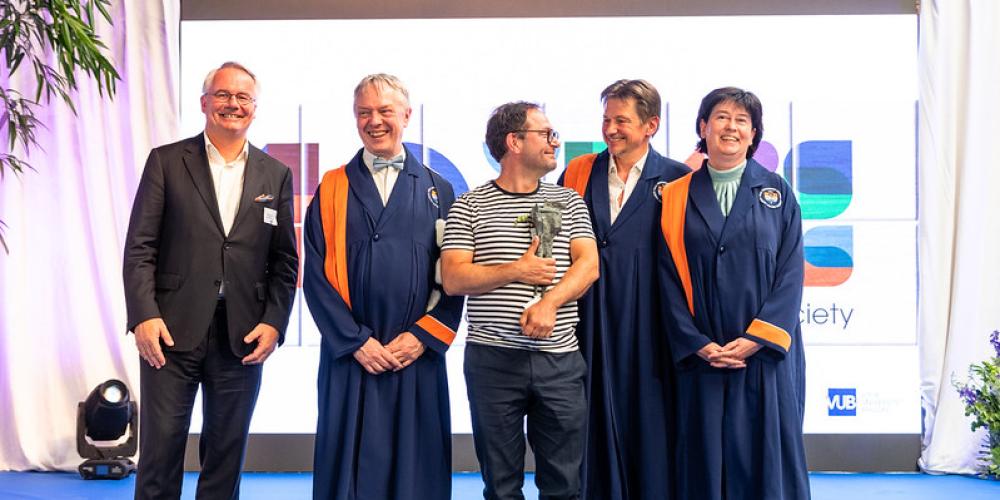
VUB gained 23 new Fellows this year. Tom Naegels is one of them. He studied Germanic languages and is a well-known author, journalist and columnist on the topics of identity, migration and journalism. His reporting and analysis appears in De Standaard and his award-winning book Nieuw België, een migratiegeschiedenis (New Belgium, a History of Migration) was published in 2021.
What do you gain from the VUB fellowship as an author and journalist?
I received a statuette at the Fellowship ceremony. It’s a small replica of Enkidoe by Paul Van Gysegem, a replica of the one on campus. I think it’s beautiful.
The specific significance of the Fellowship for me is that now I can also officially collaborate with academics. I have long been working on the history of migration in Belgium. Before that, I often called on professional historians and their work. I work at the intersection of science and journalism myself. I want to be sure that every sentence is correct. I have also had to do research, using the same techniques as academic historians.
Your book New Belgium has been well received and won awards. Is that a journalistic or an academic work?
It’s a journalistic work because it’s written for a wide audience and not for a select academic group. I want it to have the same reliability. Should there be an error on the pages, the excuse should not be that it is just a journalistic product.
The similarity is that you’re trying to tell a correct story about what happened. That you’re asking relevant questions. That you’re therefore proceeding historically. I thought initially that I had enough with existing research and only had to rely on professional texts. But I found that many things had not yet been researched. So I had to gather information myself and dive into the archives. It turns out that I enjoyed doing that. In addition to factually underpinning my argument, I also found nice details in the archives that I could use to write my story.
What’s the difference between science and journalism?
I did Germanic studies at the University of Antwerp, where I graduated in 1998. So I know the scientific method. The difference is in the form. A scientific publication starts with a literature review, explains the methodology that will be used, lists possible hypotheses for the phenomenon described and then explains why they are wrong, introduces its own hypothesis, gives arguments for that hypothesis, describes possible counterarguments and explains why they are wrong, and ends with a summary in which everything is repeated. I don’t do that because it hinders readability. I think it’s important to popularise history and make it accessible. An academic text doesn’t easily lend itself to that.
Academics have given positive reactions to my book. I also worked with most of the immigration historians. If they thought at the beginning that it would be too banal, too brief, that I wouldn’t do a proper job of it, most of them will have abandoned that idea when they saw that I’ve spent years of serious work on the subject.
Are you still working on it?
For the second volume on the history of migration in Belgium, I’ve already tried three or four beginnings. For a professional historian this is of less importance, but for a writer it’s essential that the reader is immediately drawn into the story.
The first part ran from 1944 to 1978. While writing, I realised that the book would be too thick, the topics too different and the themes too disparate to cram it into a single work. The migrations are different, so are the motivations. Before 1978 it is about guest workers, then family reunification, asylum, European migration...
The hardest part is keeping an overview: you have many more nationalities, more migration channels, migration is going to play a much more prominent role in numerous domains, from daily life to political debate. At the same time, the closer you get to the “now”, the harder it becomes to find archival sources – most archives become accessible only after 25 years. But of course, you can then interview people who have been involved in it themselves. So there is still work to do. I don’t expect to have it ready for another five years.
More information: www.vub.ac.be/fellowship.
